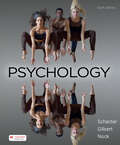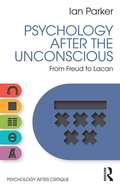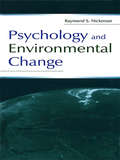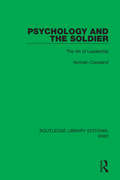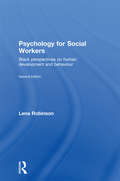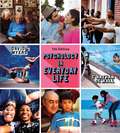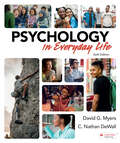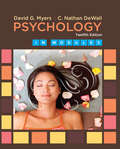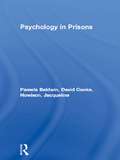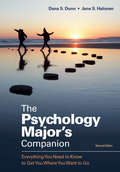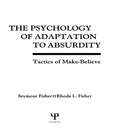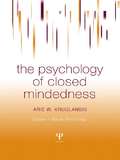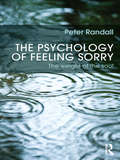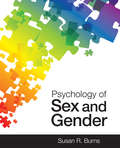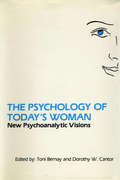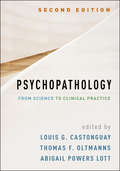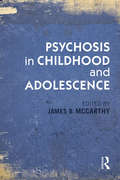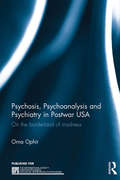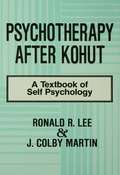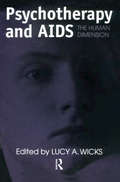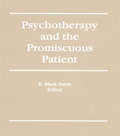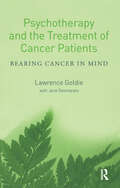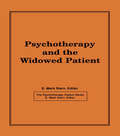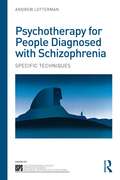Special Collections
Benetech’s Global Certified Accessible Titles
Description: Benetech’s GCA program is the first independent third-party EPUB certification to verify ebook accessibility. By creating content that is born accessible, publishers can meet the needs of all readers. Learn more: https://bornaccessible.benetech.org/
- Table View
- List View
Psychology
by Daniel L. Schacter and Daniel T. Gilbert and Matthew K. NockThe introductory psychology textbook that inspires a love of science.
Psychology After the Unconscious
by Ian ParkerIan Parker has been a leading light in the fields of critical and discursive psychology for over 25 years. The Psychology After Critique series brings together for the first time his most important papers. Each volume in the series has been prepared by Ian Parker and presents a newly written introduction and focused overview of a key topic area. Psychology After the Unconscious is the fifth volume in the series and addresses three central questions: Why is Freud’s concept of the unconscious important today? Does language itself play a role in the creation of the unconscious? How does Lacan radicalize Freud’s notion of the unconscious in relation to cultural research? The book provides a clear explanation of Freudian and Lacanian accounts of the unconscious. It also highlights their role in offering a new way of describing, understanding and working with the human subject in clinical settings and in cultural research. Part One shows how the unconscious is elaborated in Freud’s early case studies in Studies on Hysteria, while Part Two focuses on Lacan’s re-working of the unconscious and its relationship to language and culture in his influential public seminars. The book also provides access to key debates currently occurring in Freudian and Lacanian psychoanalysis, exploring both the clinical dimension and the consequences for psychological and cultural research. Psychology After the Unconscious is essential reading for students and researchers in psychology, psychosocial studies, sociology, social anthropology and cultural studies, and to psychoanalysts of different traditions engaged in academic research. It will also introduce key ideas and debates within critical psychology to undergraduates and postgraduate students across the social sciences.
Psychology and Environmental Change
by Raymond S. NickersonThis book stimulates thinking on the topic of detrimental environmental change and how research psychologists can help to address the problem. In addition to reporting environmentally relevant psychological research, the author identifies the most pressing questions from an environmental point of view. Psychology and Environmental Change: *focuses on ways in which human behavior contributes to the problem; *deals with the assessment and change of attitudes and with studies of change of behavior; *proposes ways in which psychological research can contribute to making technology and its products more environmentally benign; and *introduces topics such as consumption, risk assessment, cost-benefit and tradeoff analyses, competition, negotiation, and policymaking, and how they relate to the objective of protecting the environment.
Psychology and the Soldier
by Norman CopelandThis book, first published in 1944, stresses the point that there is no shortcut to successful wartime leadership, and pays a close analysis to the attributes that contribute to being a sound leader of soldiers. Written in the middle of the Second World War, this book gives us valuable insights into the values and training of the British Army in the second half of the war.
Psychology for Social Workers
by Lena RobinsonSocial work education has recently undergone major changes, with anti-discriminatory practice being a high priority area in professional training. Psychology for Social Workers provides an introductory text which will help qualifying and practising social workers to: understand and counteract the impact of discrimination; work in an ethnically sensitive way; demonstrate an awareness of ways to combat both individual and institutional racism through anti-racist practice. Drawing together research material and literature on black perspectives in human development and behaviour from North America and Britain, it provides a starting point that will inspire discussion and debate in the social work field and will generate future theoretical and research questions. Among the topics covered are black perspectives in group work and the family, identity development and academic achievement in black children, and mental health issues in relation to black people. Updated throughout to cover recent legislation, this second edition is an essential introductory text for all social workers in training and practice and for their teachers and trainers.
Psychology in Everyday Life
by David Myers and C. DeWallGet the brief book that speaks to all students regardless of their background or level of preparedness. This, more than any other Myers/DeWall text, acknowledges the diversity of student readers. On these pages, you will find no assumptions about: Gender Culture Economic Background Education Physical Abilities Life Experiences Relationship or Family Status Plus, this edition is heavily updated to reflect the latest in psychological science and to further emphasize the value of applying psychology to everyday life.
Psychology in Everyday Life
by David G. Myers and C. Nathan DeWallMyers' and DeWall’s briefest introduction to psychology speaks to students of all kinds, making no assumptions about student level or background.
Psychology in Modules
by David G. Myers and C. Nathan DeWallIn Psychology, Thirteenth Edition in Modules, David Myers and Nathan DeWall break down the content of the new edition of their chapter-based Psychology into 55 independent modules, assignable in any sequence and brief enough to be read in one sitting. This flexible format is favored by a wide range of students and instructors, and supported by research showing that students working with shorter reading assignments are better able to retain the concepts. From its beginnings to this remarkably fresh and current new edition, Myers and DeWall have found extraordinarily effective ways to involve students with the remarkable research underlying our understanding of human behavior. But while the content and learning support evolves edition after edition, the text itself continues to be shaped by basic goals David Myers established at the outset, including to connect students to high-impact research, to focus on developing critical thinking skills, and to present a multicultural perspective on psychology, so students can see themselves in the context of a wider world.This new edition offers 2100 research citations dated 2015–2020, making these the most up-to-date introductory psychology course resources available. With so many exciting new findings, and every chapter updated with current new examples and ideas, students will see the importance and value of psychological research, and how psychology can help them make sense of the world around them. The abundant, high quality teaching and learning resources in LaunchPad and in Achieve Read & Practice, carefully matched to the text content, help students succeed, while making life easier and more enjoyable for instructors.
Psychology in Modules
by David Myers and C. DewallIn this version of Psychology, Twelfth Edition, David Myers and Nathan DeWall break down the new edition's?16 chapters into 53 modules, assignable in any sequence and brief enough to be read in one sitting. It's a format favored by a wide range of students and instructors, one that's supported by substantial research showing that students working with shorter reading assignments develop a deeper understanding of the material. The new edition of Modules includes the same new features and content of Psychology, Twelfth Edition, including hundreds of new citations and new infographics.
Psychology in Prisons
by David Cooke and Pamela Baldwin and Jacqueline HowisonPsychology in Prisons illustrates how a knowledge of psychological principles can lead to a better understanding of the prison environment and the problems that occur within it. The authors show how psychology can be used to increase understanding of prisoners and to deal with day-to-day problems in prison life. They focus on key problem areas such as sex offenders, violent criminals and the issue of AIDS. The book also explores the effects of the prison environment on staff and suggests means of reducing the levels of stress.
The Psychology Major’s Companion
by Dana Dunn and Jane HalonenDesigned to help both prospective and current psychology majors know what to expect from the undergraduate major, the larger discipline, and the marketplace beyond campus, The Psychology Major's Companion, Second Edition gives students a map to planning their career in psychology. The authors include helpful skill-related tips, how to decide on options for course study, and how to apply to graduate school or get a job with an undergraduate degree.
The Psychology of Adaptation To Absurdity
by Seymour Fisher and Rhoda L. Fisher and Rhoda FisherThe major goal of this book is to explore and integrate all that is scientifically known about the utility of magical plans and strategies for coping with life's inevitable absurdities. Make-believe has great adaptive value and helps the average individual to function better in cultures saturated with puzzling contradictions. This book traces the origins of pretending (illusion-construction) and the developmental phases of this skill. Further, it analyzes how parents depend on pretending to secure conformity and self-control from their children. It unravels the ways in which make-believe is utilized to defend against death-anxiety and feelings of fragility. It examines the relationship between pretending and the classical defense mechanisms -- and particularly weighs the evidence bearing on the potential protective power of embracing religious beliefs. Finally, it defines the diverse contributions of make-believe to the construction of the self-concept, the defensive maneuvers typifying psychopathology, and the maintenance of somatic health. In short, this book pulls together a spectrum of scientific information concerning the defensive value of illusory make-believe in coping with those aspects of life -- such as death, loss, suffering, and injustice -- that are experienced as unreasonable and beyond understanding. The volume is unique not only in the breadth of the literature it analyzes but also in demonstrating the contribution of make-believe to both the psychological and somatic aspects of behavior. No previous work has documented in such detail and across so many domains how basic the capacity to engage in make-believe is to human adaptation.
The Psychology of Closed Mindedness
by Arie W. KruglanskiThe fundamental phenomenon of human closed-mindedness is treated in this volume. Prior psychological treatments of closed-mindedness have typically approached it from a psychodynamic perspective and have viewed it in terms of individual pathology. By contrast, the present approach stresses the epistemic functionality of closed-mindedness and its essential role in judgement and decision-making. Far from being restricted to a select group of individuals suffering from an improper socialization, closed-mindedness is something we all experience on a daily basis. Such mundane situational conditions as time pressure, noise, fatigue, or alcoholic intoxication, for example, are all known to increase the difficulty of information processing, and may contribute to one's experienced need for nonspecific closure. Whether constituting a dimension of stable individual differences, or being engendered situationally - the need for closure, once aroused, is shown to produce the very same consequences. These fundamentally include the tendency to 'seize' on early, closure-affording 'evidence', and to 'freeze' upon it thus becoming impervious to subsequent, potentially important, information. Though such consequences form a part of the individual's personal experience, they have significant implications for interpersonal, group and inter-group phenomena as well. The present volume describes these in detail and grounds them in numerous research findings of theoretical and 'real world' relevance to a wide range of topics including stereotyping, empathy, communication, in-group favouritism and political conservatism. Throughout, a distinction is maintained between the need for a nonspecific closure (i.e., any closure as long as it is firm and definite) and needs for specific closures (i.e., for judgments whose particular contents are desired by an individual).Theory and research discussed in this book should be of interest to upper level undergraduates, graduate students and faculty in social, cognitive, and personality psychology as well as in sociology, political science and business administration.
The Psychology of Feeling Sorry
by Peter RandallCan feeling genuinely sorry enable an important healing experience? Can relieving the weight of guilt restore a general sense of self-worth? Can an individual's dawning awareness give birth to feelings of remorse; perhaps even to acts of repentance? The concepts of betrayal, vengeance and forgiveness have long been a major part of religious doctrine throughout the world. However, only in recent times has the impact of these emotions become of interest to those involved in psychological study. In The Psychology of Feeling Sorry, Peter Randall links contemporary psychological research with religious teachings and doctrine that have provided spiritual guidance for hundreds of years. Illustrated with explanatory narratives, Randall fuses religious precepts with psychological theory concerning one of the least understood but most common of human emotions; feeling bad about one's 'sins'. Using an eclectic approach Randall explores how much of what is believed within the domain of faith is now supported by modern psychological research. This book will be of interest not only to those with religious beliefs, but to psychologists, psychotherapists, students, and anyone with an interest in the intersection of psychology, psychotherapy, and theology.
Psychology of Sex and Gender
by Susan R. BurnsPsychology of Sex and Gender also includes the necessary coverage of what is considered foundational to the understanding of sex and gender and issues, but much more time is spent on the current research and implications that guide our present understanding of the topics. The majority of the research cited is recent, covering important topics like PTSD and women in the military, research on sex and gender differences in the use of opioids, differences in neural responding in men based on sexual orientation, the evolving portrayal of female characters in video games, and the varying socialization of normative masculinity across cultures.
The Psychology of Today's Woman
by Toni Bernay and Dorothy W. CantorThe sexual revolution, oft discussed in the journalistic literature of recent years, has brought in its wake a host of questions that are only beginning to be addressed. How are women coping with "real world" challenges for which they may be ill prepared, both socially and psychologically? How successfully are they integrating old and new ego ideals in forging new identities? Is their ostensible "liberation" actually making for a sense of integration and wholeness? The Psychology of Today's Woman: New Psychoanalytic Visions probes these and related questions from the standpoint of both developmental and therapeutic concerns. Taking Freud's notion of female sexuality as a point of departure, editors Bernay and Cantor have compiled a collection of original essays that reassesses traditional conceptions of female psychology (Section I), proffers new visions of femininity (Section II), and explores critical situations in the lives of contemporary women (Section III). A final section of the book, of special interest to analysts and psychotherapists, examines the various facets of the clinical treatment of women. Collectively, the contributors to this volume articulate a strong challenge to the "deficiency model" of female identity that has long dominated psychoanalytic theory. More impressively still, they offer constructive alternatives to the preconceptions of the past. They converge in the belief that the richness and diversity of female experience cannot be encompassed in the overly simplified definitions and "masculine" analogizing of classical analysis. Whether we investigate the status of "masculinity" and "femininity" as personality traits, the relationship between "nurturance" and "aggression" in female identity, or the meaning of "normality" and "pathology" in treatment situations, we are very much in a realm of multiple truths in which the formulas of the past give little sense of the options of the present or the possibilities of the future.
Psychopathology, Second Edition
by Thomas F. Oltmanns and Louis G. Castonguay and Abigail Powers LottThe text of choice for instructors looking for an innovative, empirically based, and practice-oriented perspective on psychopathology is now in a revised and expanded second edition with 50% new material. The volume presents state-of-the-art information on the disorders most frequently seen in clinical practice, reviewing their etiology, DSM-5 classification, symptoms and clinical features, course, epidemiology, and associated comorbidities. With the goal of integrating science and practice, each chapter also provides substantive therapeutic guidelines derived from the research. Contributors identify underlying principles of change that clinicians can draw on to improve their effectiveness and offer critical guidance for assessment, case formulation, and evidence-based intervention. New to This Edition *Chapters on new topics--suicide, sleep difficulties, and sexual dysfunction. *New chapter on an existing topic: schizophrenia. *Updated throughout with current theory, findings, and clinical advances. *Increased attention to transdiagnostic concerns.
Psychosis in Childhood and Adolescence
by James B. McCarthyPsychosis in Childhood and Adolescence offers an in-depth examination of the nature of psychosis, its risk factors and its manifestations in children and adolescents who experience a continuum of emotional disorders. The chapters present a hopeful, research-based framework for treatment. They emphasize combined treatment that is based on psychodynamic and cognitive behavioral psychotherapy principles, pharmacological interventions and supportive family approaches that reflect the vulnerabilities and resources of the individual child. This text highlights the importance of thorough assessment and the need for long-term treatment that facilitates the psychotic child’s healthy maturation. Readers will benefit from the case examples that illustrate the complexity of psychosis and the discussions of diagnostic and treatment issues as presented by experienced clinicians and researchers.
Psychosis, Psychoanalysis and Psychiatry in Postwar USA
by Orna OphirCovering the last four decades of the 20th century, this book explores the unwritten history of the struggles between psychoanalysis and psychiatry in postwar USA, inaugurated by the neosomatic revolution, which had profound consequences for the treatment of psychotic patients. Analyzing and synthesizing major developments in this critical and clinical field, Orna Ophir discusses how leading theories redefined what schizophrenia is and how to treat it, offering a fresh interpretation of the nature and challenges of the psychoanalytic profession. The book also considers the internal dynamics and conflicts within mental health organizations, their theoretical paradigms and therapeutic practices. Opening a timely debate, considering both the continuing relevance and the inherent limitations of the psychoanalytic approach, the book demonstrates how psychoanalysts reinterpreted their professional identity by formalizing and disseminating knowledge among their fellow practitioners, while negotiating with neighboring professions in the medical fields, such as psychiatry, pharmacology and the burgeoning neurosciences. Chapters explore the ways in which psychoanalysts constructed – and also transgressed upon – the boundaries of their professional identity and practice as they sought to understand schizophrenia and treat its patients. The book argues that among the many relationships psychoanalysis sustained with psychiatry, some weakened their own social role as service providers, while others made the theory and practice of psychoanalysis a viable contender in the jurisdictional struggles between professions. Psychosis, Psychoanalysis and Psychiatry in Postwar USA will appeal to researchers, academics, graduate students and advanced undergraduates who are interested in the history of psychoanalysis, psychiatry, the medical humanities and the history of science and ideas. It will also be of interest to clinicians, health care professionals and other practitioners.
Psychotherapy After Kohut
by Ronald R. Lee and J. Colby MartinHailed as "a superb textbook aimed at introducing psychoanalytic self psychology to students of psychotherapy" (Robert D. Stolorow), Psychotherapy After Kohut is unique in its grasp of the theoretical, clinical, and historical grounds of the emergence of this new psychotherapy paradigm. Lee and Martin acknowledge self psychology's roots in Freud's pioneering clinical discoveries and go on to document its specific indebtedness to the work of Sandor Ferenczi and British object relations theory. Proceeding to readable, scholarly expositions of the principal concepts introduced by Heinz Kohut, the founder of self psychology, they skillfully explore the further blossoming of the paradigm in the decade following Kohut's death. In tracing the trajectory of self psychology after Kohut, Lee and Martin pay special attention to the impact of contemporary infancy research, intersubjectivity theory, and recent empirical and clinical findings about affect development and the meaning and treatment of trauma.
Psychotherapy And AIDS
by Lucy A. WicksFirst published in 1997. Routledge is an imprint of Taylor & Francis, an informa company.
Psychotherapy and the Promiscuous Patient
by E Mark SternLearn effective strategies for therapy with promiscuous patients from this in-depth exploration of the phenomenon of promiscuity in the lives and backgrounds of patients seeking psychotherapy. This unique book features insights about the pitfalls of patients who cannot bear commitment to any one person, or who jeopardize their commitments with a need to spark their lives with promiscuity. Psychotherapy and the Promiscuous Patient teaches psychotherapists to respond to their patients’promiscuous behavior as a symptom of a problem, not the problem itself. A realm of aspects of promiscuity are explored within the psychiatric context. Promiscuity is very broadly defined in fascinating examinations of adult promiscuity as a result of childhood sexual abuse, hypersexuality in adult males, addiction to the sensation of “falling in love,” career promiscuity, and even psychotherapy as an uncommon “promiscuity’--a nonexclusive, altruistic love. Timely chapters confront the changing distinctions between promiscuity and sex addiction and challenge readers to uncover the various emotional needs met by promiscuity in order to protect patients from their self-destructive behavior. Knowledgeable practicing psychotherapists relate methods for dealing with patients’constant restlessness and working with a variety of patients in an intimate setting. Psychotherapy and the Promiscuous Patient contains invaluable strategies that can be directly applied to practice including: the use of narrative construction and reconstruction as treatment for sexually promiscuous clients a self-psychological approach to treatment the importance of confusion as an introduction to change in therapy a method of self-investigation applied to promiscuous behavior the implications of the clinical meaning and therapeutic use of strong-laughter outbursts in psychology a self-psychology perspective on transference to therapistsPsychotherapy and the Promiscuous Patient is a valuable clinical book for psychotherapists, and it offers an across the board appeal to a wide variety of psychiatrists and related social scientists who are interested in today’s shifting moral climate. It is also an ideal supplemental text for an introductory methods or applications in psychiatry course.
Psychotherapy and the Treatment of Cancer Patients
by Jane Desmarais and Lawrence GoldiePsychotherapy and the Treatment of Cancer Patients addresses the need for a more integrated care of cancer patients within hospitals which pays attention to the mental anguish as well as physical distress caused by the disease. This book is based on Lawrence Goldie's own research with cancer patients, which has shown that psychoanalytic psychotherapy together with general medical care can significantly help dying patients cope with the pain and suffering associated with the disease. Drawing on this research, the book advocates a more holistic approach to the cancer patient and suggests ways in which more expert attention might be provided through awareness, training and resources. The book describes the innovative approach of applying the psychoanalytic psychotherapeutic approach within the hospital context to help individuals cope with cancer. As well as an overview of cancer and the therapeutic approach, topics covered include: * the impact of cancer on hospital relationships * cancer in different areas of the body and mind * ‘mind-bending pain’ * dread and trauma - on being told the truth * psychoanalytic psychotherapy in the NHS 'general' hospital * examining group processes in hospital. Psychotherapy and the Treatment of Cancer Patients challenges the existing orthodoxies about palliative care and points to ways in which the principles and methods of psychoanalysis can be applied successfully to cancer care within the hospital context.
Psychotherapy and the Widowed Patient
by E Mark SternComing at a time of renewed interest in the developmental changes of the life cycle, Psychotherapy and the Widowed Patient is a rich resource that examines the impact of a spouse's death on an individual's mental health. Psychiatrists and psychoanalysts address a wide range of issues concerning loss, grief, and bereavement, and provide practical and creative approaches for both widowed persons and the helping professionals charged with treating their grief. Chapters in this compassionate volume discuss the characteristics of individuals who are more likely to seek professional help in coping with grief, widowhood as a time of growth and development, the value of openness instead of denial in dealing with death, the grieving process in young widowed spouses, the similarities of widowhood to separation and divorce, the role of dependency in how well widowed patients develop emotionally, and the role of loyalty in the process of grief. The more clinical chapters examine strategies for carrying out experiential psychotherapy with widowed patients, rational-emotive therapy, grief therapy, the effects of new perspectives on spousal bereavement on clinical practice, and aspects of bereavement response to loss, with a timeframe for viewing psychotherapeutic intervention. A review of the psychological literature regarding widowhood completes this comprehensive new book.
Psychotherapy for People Diagnosed with Schizophrenia
by Andrew LottermanIn this unique book, Andrew Lotterman describes a creative approach to the psychotherapy of people diagnosed with schizophrenia and other forms of psychosis. Lotterman focuses on specific techniques that can be used in psychological therapy with people who have symptoms such as hallucinations, delusions, paranoia, ideas of reference, looseness of association and pressured speech. Formerly titled Specific Techniques for the Psychotherapy of Schizophrenic Patients, this edition updates research on the biology and psychology of psychosis and explores the many controversial issues surrounding diagnosis. It also includes two new chapters on the psychology and treatment of paranoia and on the experience of having a shattered self and the delusion of being the Messiah. Lotterman’s innovative approach aims to help patients with one of the most debilitating symptoms of psychosis: the collapse of language use. By restoring language as a way of communicating the patient’s meaningful inner life to himself and to others, the patient is then able to undertake a more traditional form of verbal psychotherapy. The book presents detailed case histories of patients who have benefited from this method, highlighting the specific techniques used and the psychological improvements that followed. The approach presented here complements medication-based treatments that have only had partial success, as well as other psychological approaches such as cognitive behavioural therapy, family therapy and social skills training. Psychotherapy for People Diagnosed with Schizophrenia will be a valuable text for clinicians working with people suffering from psychosis, including psychotherapists, psychoanalysts, psychologists, physicians and social workers. It will also be of great interest to academics and students.
